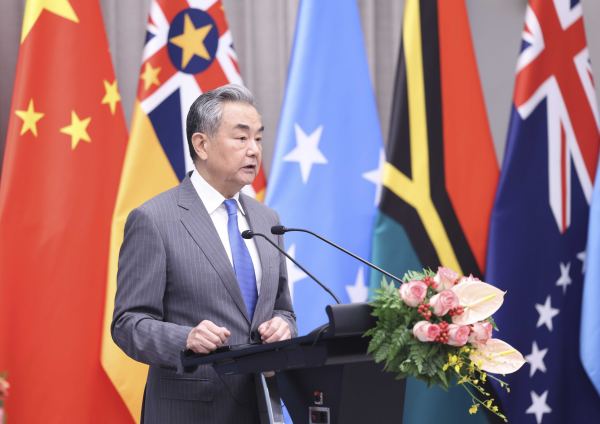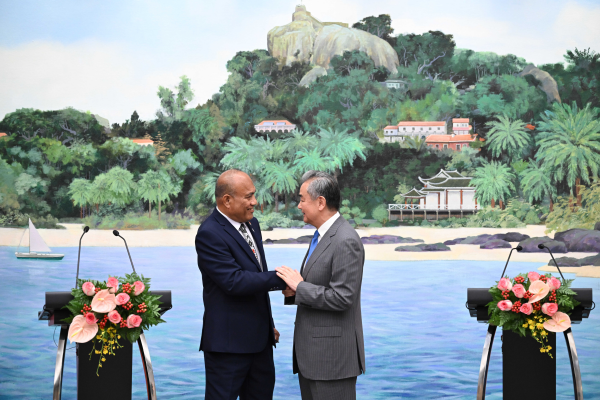
The People’s Republic of China


On May 28, 2025, Member of the Political Bureau of the CPC Central Committee and Foreign Minister Wang Yi co-chaired the Third China-Pacific Island Countries Foreign Ministers' Meeting with President and Foreign Minister of Kiribati Taneti Maamau in Xiamen.
When meeting the press with Taneti Maamau after the Third China-Pacific Island Countries Foreign Ministers' Meeting, Wang Yi said that this Foreign Ministers' Meeting was held offline for the first time in China since the establishment of the China-Pacific Island Countries Foreign Ministers' Meeting mechanism in 2021. Fujian, as the starting point of the 21st Century Maritime Silk Road, shares deep historical ties with Pacific Island Countries (PICs). Twenty-five years ago, during his tenure in Fujian, President Xi Jinping personally promoted cooperation between China and PICs. Among the outcomes, the Juncao project has become a shining hallmark of bilateral cooperation on sustainable development. Holding the meeting in Xiamen is of great significance.
Wang Yi pointed out that all parties attending the meeting, in accordance with the consensus reached by President Xi Jinping and the leaders of PICs, had in-depth exchanges focusing on how to advance bilateral cooperation as well as international and regional issues of common interest and concern, and reached consensus in five aspects.
First, advocate for equal treatment. China consistently upholds the principle that all countries, regardless of size, are equal. In its engagement with PICs, China steadfastly adheres to the "four full respects" principle, that is, China fully respects the sovereignty and independence of PICs, fully respects their will, fully respects their cultural traditions and fully respects their effort to seek strength through unity. China appreciates that PICs have proactively reaffirmed their commitment to the one-China principle and have expressed their understanding and support for China's legitimate rights to safeguard its national sovereignty and territorial integrity. On the occasion of the 80th anniversary of the victory in World War II and the 80th anniversary of the return of Taiwan to China, PICs' commitment is just in time. This shows that there is no market for "Taiwan independence" in PICs. China will work with PICs to continue supporting each other and safeguarding their respective core interests and major concerns.
Second, advocate for common development. Both sides are committed to promoting synergy between high-quality Belt and Road cooperation and the 2050 Strategy for the Blue Pacific Continent, and strengthening mutually beneficial cooperation in areas such as infrastructure, trade, investment, agriculture, fishery, tourism and civil aviation. China will provide more convenience for the export of quality products from PICs to China, enabling PICs to share the benefits of China's vast market.
Third, advocate for fairness and justice. Both sides will take the commemoration of the 80th anniversary of the founding of the United Nations as an opportunity to firmly uphold multilateralism, safeguard the international system with the United Nations at its core, maintain the international order underpinned by international law, defend the multilateral trading system with the World Trade Organization at its core, and protect the legitimate rights and interests of developing countries.
Fourth, advocate for openness and inclusiveness. The Pacific Ocean is large enough to accommodate win-win cooperation among all countries. The international community should support PICs' independent choice of development cooperation partners. When developing relations with PICs, it is important to prioritize the most urgent issues, such as addressing climate change, promoting economic development, improving people's livelihoods and maintaining social stability.
Fifth, advocate for mutual learning. The Chinese civilization and the unique marine civilization of PICs are precious world heritages. Both sides should continue to carry forward the traditional friendship and emotional bond between China and PICs, jointly implement the Global Civilization Initiative, further strengthen exchanges and cooperation in various fields such as education, culture, media, think tanks, youth, women, sports and at the sub-national level, enhance mutual understanding and support through mutual learning, and jointly promote the progress of human civilization.




